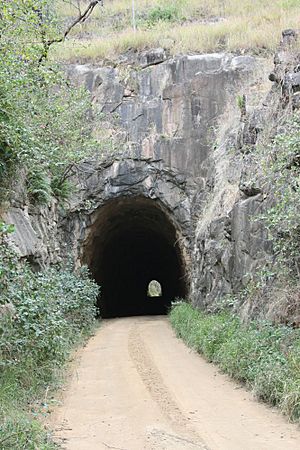Boolboonda Tunnel facts for kids
Quick facts for kids Boolboonda Tunnel |
|
|---|---|

Boolboonda Railway Tunnel western portal, 2009
|
|
| Location | Tunnel Road, Boolboonda, Bundaberg Region, Queensland, Australia |
| Design period | 1870s - 1890s (late 19th century) |
| Built | 1881 - 1884 |
| Official name: Boolboonda Railway Tunnel, SEQ-6Q 1 | |
| Type | state heritage (built) |
| Designated | 24 September 1999 |
| Reference no. | 601516 |
| Significant period | 1880s (fabric) 1884-1960 (historical railway use of tunnel) |
| Significant components | cutting - railway, tunnel - railway |
| Builders | O'Rourke & McSharry |
| Lua error in Module:Location_map at line 420: attempt to index field 'wikibase' (a nil value). | |
The Boolboonda Tunnel is an old railway tunnel in Queensland, Australia. It's located on Tunnel Road near Boolboonda in the Bundaberg Region. This tunnel is special because it's the longest unsupported man-made tunnel in Queensland. This means it was dug through solid rock and didn't need extra supports inside.
It was built between 1881 and 1884 by a company called O'Rourke & McSharry. The tunnel was part of a railway line that connected Bundaberg to the copper mines at Mount Perry. Today, the railway tracks are gone, but the tunnel is still there. It's now used by cars and is home to a colony of little bent-wing bats!
Contents
Building the Boolboonda Tunnel
Why a Tunnel Was Needed
In the late 1800s, people found copper in the Mount Perry area. Miners needed a way to get the copper from the mines to a port. This is why they decided to build a railway line. At first, they thought about a private railway. But then, the government decided to build a state-owned line instead.
Surveyors, like Thornloe Smith, explored the land in 1875. They found that the area was very rugged. This meant they would need to dig a tunnel through the Boolboonda Range.
Digging Through Hard Rock
The railway line was built in two parts. The second part included the tunnel. Building the tunnel was a big challenge. The engineers had to dig through very hard granite rock. This rock was so strong that the tunnel didn't need any extra lining or supports. This was the first time a tunnel in Queensland was built this way! It also made the project cheaper.
Workers used special machines with boilers and air compressors. These machines helped them drill through the rock faster. They dug from both ends of the tunnel at the same time. The two digging teams met in the middle on June 19, 1883.
Opening the Railway Line
The section of the railway line that reached Boolboonda opened on November 12, 1883. The entire line, including the tunnel, officially opened for trains on May 19, 1884. The tunnel itself is about 192 meters (or 584 feet) long.
Life of the Railway Line
Copper Mines and Train Traffic
Soon after the railway line was finished, the Mount Perry copper mines closed for a while. They reopened later and had a smelter to process the copper. But they closed again around the time of the First World War.
For the next 50 years, the railway line mostly carried other goods. These included dairy products, livestock, and timber. Sugar from Gin Gin was also transported to a mill.
The Line Closes
In 1960, the section of the railway line from Tirroan to Mount Perry closed. This was because not enough goods were being transported anymore. The tracks were removed in 1961. The very last part of the Bundaberg Railway, from Bundaberg to Gin Gin, closed in 1992.
Today, the Boolboonda Tunnel is one of the few things left from that old railway line. It's now open for cars to drive through.
What the Tunnel Looks Like Today
The Boolboonda Railway Tunnel is 192 meters long. You can find it on Tunnel Road, about 11 kilometers from Mount Perry. It's still unlined and unsupported, just as it was built. This shows how strong the granite rock is. The Bundaberg Regional Council takes care of the tunnel. It's a cool place to visit, and you might even see some bats!
Why the Tunnel is Important
The Boolboonda Railway Tunnel is listed on the Queensland Heritage Register. This means it's a special historical place.
- A Piece of Queensland's Past: It shows how railways helped Queensland grow in the 1880s.
- A Unique Design: It's one of the few railway tunnels in Queensland that didn't need lining or extra support. This makes it very special. It also doesn't have fancy entrances (portals), which is unusual.
- Looks Great: The tunnel is a beautiful and interesting part of the landscape.
- Important to the Community: It has a special meaning for the people who live nearby.
 | Delilah Pierce |
 | Gordon Parks |
 | Augusta Savage |
 | Charles Ethan Porter |

